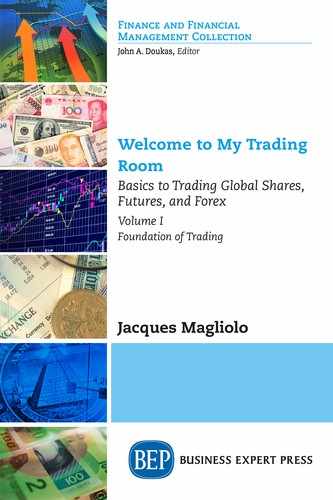The market will be here tomorrow.
This Volume is the culmination of an idea, which I had many years ago, to compile a comprehensive body of literature on trading; from total basics to entering international markets.
Consequently, these three volumes are just the start of this idea to effectively mentor novice traders while, at the same time, teach students and private clients the basics of trading and, then build depth of knowledge, skill, and experience. The aim is to write a number of books to cover the elements that make up sound trading techniques, from fundamental analysis to identifying corporate strength, to recognizing effective technical triggers to time securities trading; basics of investments through to setting up a strategy to trade for a living.
This idea germinated after I had completed a set of articles for a South African financial newspaper on share analysis and company forecasting. The series became extremely popular, for which I was grateful, but it was the indirect consequence of these articles that led me to taking my first step to writing a financial book. An elderly CEO of an international motor corporation phoned me and it is what he said that has had a direct result in these volumes being compiled and written.
The CEO: “Do you know how little boards of directors understand about markets, how they work, and what influences share prices?”
My first thought was that this was their problem, but on review it struck me that this CEO was making a point about the company’s share price and only indirectly about his directors. So, he admitted, if directors know these factors affect their company’s shares, then they could influence share price by improving investor sentiment.
I felt that, after seeing hundreds of companies with poor financial structures, and even worse management controls, result in appalling investor sentiment and thus declining share prices—he was making an extremely pertinent point.
Ultimately, the articles and the CEO’s comments became my entrée into the world of corporate finance, stockbroking, and that of writing my first book, Share Analysis and Company Forecasting in 1995. The Business Plan: A Manual for South African Entrepreneurs was published the following year and became the business textbook at the University of Kwa-Zulu Natal in South Africa.
The next three financial books looked at issues that make up trading in a global and emerging market environment; including strategy, emergence of small capitalization stock exchanges, like the UK’s AIM (Alternative Investment Market), Canada’s TSX, and the South African Alternative Exchange (AltX) and the similarities between standard portfolio theory and entrepreneurial methodologies.
In 2003, Jungle Tactics: Global Research, Investment & Portfolio Strategy covered factors that influence businesses and portfolio investments in a global market, A Guide to AltX (2004) outlined the methodologies of how to prepare for listing on a small cap market and Corporate Mechanic: The Analytical Strategist’s Guide (2007) set out methods to restructure a company to become efficient, profitable, and protected from the hostilities of international corporate raiders.
During the following years, I had left stockbroking to head up Business Consulting International and immediately noted two new corporate trends. First, entrepreneurship was becoming increasingly international, with cross-border business rising, and online trading was becoming extremely popular.
Consequently, I decided to write a book on global project management and The Guerrilla Principle: Winning Tactics for Global Project Managers was published in 2008 by Juta. This book was rated number two worldwide and was quickly followed by four books on trading methodologies, namely Richer Than Buffett, Women & Wealth, Lore of the Global Trader and Master Trader.
In 2013, I was commissioned to write and edit a book entitled Business & Entrepreneurship, for a South African business school.
When you work as a trader you will find that most of your time is spent researching, analyzing, and strategizing on market and industry trends and how determining trading ranges and fair value.
So, if you think that you will be glued to a screen, buying and selling shares for hours at a time, then you need to learn the first lesson of trading, which is that this is a professional industry and not a gambling arena. You trade based on preestablished rules and analyses. This doesn’t mean that trading is boring, merely conducted in an organized and predetermined manner. Ultimately, experience combined with skill, knowledge, and discipline will push you into the professional status. But heed a warning, it is easy to become complacent and sloppy, ignoring your own trading strategies by chasing the market when profitable trends seem to be easy and winning seems obvious. This is the greed factor that leads many novice traders to go back to their day jobs.
